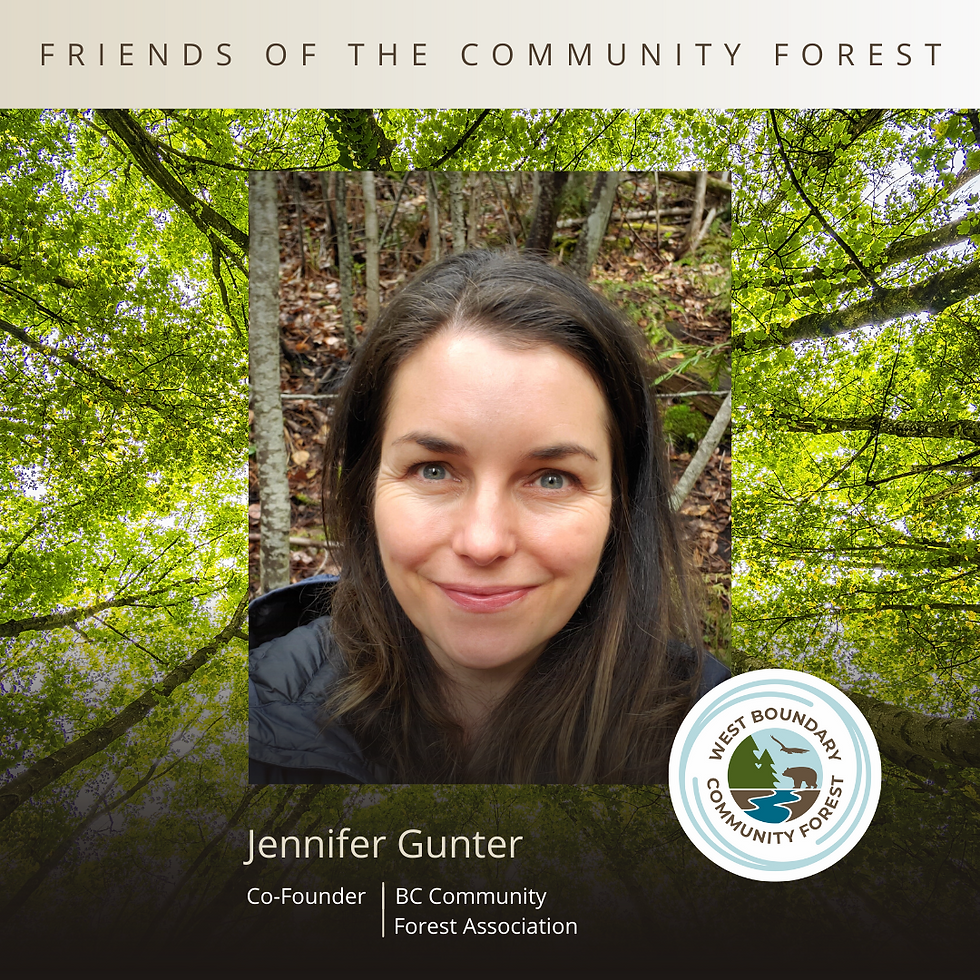Friends of the Community Forest: Jennifer Gunter, Co-founder, BC Community Forest Association
- West Boundary Community Forest

- Dec 15, 2022
- 3 min read
At the West Boundary Community Forest (WBCF), we work together to ensure the decisions we make in our forest have the best interest of the community in mind. We view our community forest as a shared space, inviting diverse points of view for every decision. To us, people play a key role in the prosperity of the community forest and help build healthy communities.

This feature is our opportunity to amplify the voices of friends of the West Boundary Community Forest, who help us ensure every project follows community values, goals, and objectives. Today we introduce Jennifer Gunter, one of the co-founders of the BC Community Forest Association (BCCFA) – the voice and advocate for community forests as well as communities seeking to get community forest tenures – and the long-time executive director, who has fervently supported the West Boundary Community Forest.

“The West Boundary Community Forest has been a member of the BC Community Forest Association for over 10 years, even before they got their community forest tenure,” said Gunter, who has worked in community forestry and community
economic development for over 20 years.
Gunter has always had a passion for forestry and the environment, and did her undergraduate studies in Geography and Environmental Studies from McGill University, and Masters in Resource Management from Simon Fraser University. The work that community forests across the province are undertaking, in order to adapt to climate change and reduce the risk of catastrophic wildfires, is what excites her.
According to Gunter, the value of community forestry as a strategy for community economic development and ecosystem resiliency, and taking tangible steps to advance reconciliation with Indigenous Peoples and build relationships between Indigenous and non-Indigenous communities, is where she has found common ground with WBCF.

“West Boundary Community Forest was the 2020 recipient of the Robin Hood Memorial Award for Excellence in Community Forestry. They are a true inspiration and totally deserving of the award,” said Gunter. “They were recognized as leaders in wildfire mitigation, stewardship, education, recreation, and their work to cultivate and build a strong relationship with the Osoyoos Indian Band.”
Gunter believes that the forest sector is changing rapidly and needs to evolve. An important part of the changes is the recognition of Indigenous rights and title and the UN Declaration on the Rights of Indigenous Peoples as the framework for reconciliation, Gunter explained.
“Many community forests, like the West Boundary Community Forest, are blazing the trail and demonstrating a different way of doing things. I see the critically important role that forest management must play in mitigating and adapting to climate change.”
Gunter wants people to focus on the need to develop systems that enhance resiliency for the forests, as people are gradually starting to view forests with different lenses than in the past – climate change mitigation, carbon sequestration and storage, and biodiversity conservation. The pandemic has also raised awareness of the benefits of time spent in forests on people’s health and wellness, highlighting the importance of the recreational value of forests. She hopes that community forests across the province will continue their work to keep the momentum going.
“B.C. is working on a paradigm shift in B.C.’s forest sector – to prioritize ecosystem health. Many community forests in our province have always operated this way, and many, like West Boundary Community Forest, are leaders in the type of forest management that we want to see,” said Gunter, adding, “The West Boundary Community Forest is a great example of what community forestry can make happen for local communities. Local people, local forests, local decisions.”
For more on the BCCFA, visit www.bccfa.ca
Healthy Forests. Healthy Communities













Comments